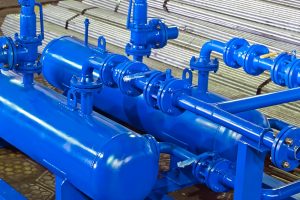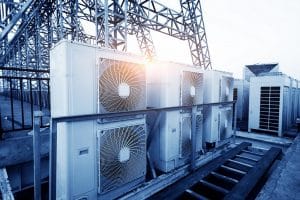 By making electrical thermal management easier and more predictable in many cases, heat exchangers have been an important development in the advancement of modern technology. Companies that create heat exchangers have benefited, as well, by using that technology to optimize the heat exchanger manufacturing process. For example, innovations such as in-house manufacturing capabilities and rapid 3D printing help streamline the design, testing, and creation of heat exchangers to make manufacturing them even more efficient. (more…)
By making electrical thermal management easier and more predictable in many cases, heat exchangers have been an important development in the advancement of modern technology. Companies that create heat exchangers have benefited, as well, by using that technology to optimize the heat exchanger manufacturing process. For example, innovations such as in-house manufacturing capabilities and rapid 3D printing help streamline the design, testing, and creation of heat exchangers to make manufacturing them even more efficient. (more…)
A Few Ways Companies Benefit from Modern Heat Exchangers
 These days, electrical thermal management is vital to most manufacturing and other companies, as well as to virtually all forms of modern technology. Because of its importance, thermal management is also one of the most significant areas in which companies seek to streamline operations. For most of them, the addition of modern, high-performance heat exchangers accomplishes that goal with surprisingly effective and efficient results. In addition to streamlining electrical thermal management, heat exchangers also make overall operations more reliable, less costly, and easier to maintain. (more…)
These days, electrical thermal management is vital to most manufacturing and other companies, as well as to virtually all forms of modern technology. Because of its importance, thermal management is also one of the most significant areas in which companies seek to streamline operations. For most of them, the addition of modern, high-performance heat exchangers accomplishes that goal with surprisingly effective and efficient results. In addition to streamlining electrical thermal management, heat exchangers also make overall operations more reliable, less costly, and easier to maintain. (more…)
What Do Heat Exchangers Have to Do with Wastewater Treatment?
 As more companies use them and more advanced technology relies on them, heat exchangers have taken on several roles beyond just cooling electrical control panels. For example, in many instances, the advanced thermal management solutions also help companies streamline processes such as wastewater treatment. Unlike cooling electrical enclosures, which involves collecting and transferring waste heat from sensitive components, wastewater treatment and similar processes rely on the sustained application of heat. Using heat exchangers, companies can provide that heat more conveniently and at a much lower cost than ever before. (more…)
As more companies use them and more advanced technology relies on them, heat exchangers have taken on several roles beyond just cooling electrical control panels. For example, in many instances, the advanced thermal management solutions also help companies streamline processes such as wastewater treatment. Unlike cooling electrical enclosures, which involves collecting and transferring waste heat from sensitive components, wastewater treatment and similar processes rely on the sustained application of heat. Using heat exchangers, companies can provide that heat more conveniently and at a much lower cost than ever before. (more…)
Aiming for Eco-Friendliness? Start with Heat Exchangers
 These days, companies aim to do more than just optimize efficiency and productivity. They also seek to improve their operations long-term by implementing greener, more sustainable operations, often choosing technologies and processes based on their level of eco-friendliness. In many instances, those efforts are most effective when a company concentrates first on its thermal management processes. All forms of technology rely on these processes, and ensuring that they remain as cost and energy efficient as possible is paramount to ensuring any other aspect of a company’s operations are just as eco-friendly. (more…)
These days, companies aim to do more than just optimize efficiency and productivity. They also seek to improve their operations long-term by implementing greener, more sustainable operations, often choosing technologies and processes based on their level of eco-friendliness. In many instances, those efforts are most effective when a company concentrates first on its thermal management processes. All forms of technology rely on these processes, and ensuring that they remain as cost and energy efficient as possible is paramount to ensuring any other aspect of a company’s operations are just as eco-friendly. (more…)
How Efficient Are Heat Exchangers?
 A lot is said about the more efficient manner in which modern heat exchangers transfer heat when compared to more traditional solutions. For example, companies that implement heat exchangers in favor of air conditioners almost immediately notice the smoother and more reliable thermal management processes that they provide. Heat exchangers also improve efficiency in several areas, though, which make them even more beneficial in the long-run than companies may realize at first. (more…)
A lot is said about the more efficient manner in which modern heat exchangers transfer heat when compared to more traditional solutions. For example, companies that implement heat exchangers in favor of air conditioners almost immediately notice the smoother and more reliable thermal management processes that they provide. Heat exchangers also improve efficiency in several areas, though, which make them even more beneficial in the long-run than companies may realize at first. (more…)
How Do Heat Exchangers Differ from Air Conditioning?
 In many ways, it’s obvious how different heat exchangers are from more traditional air conditioning equipment. Not only do they look different, but the very methods they use to prevent electrical overheating vastly differ from each other, as well. By utilizing completely different thermal management methods, heat exchangers have resounding benefits that far exceed what air conditioners can provide. That includes impacting the overall costs of electrical thermal management, as well as the environmental footprint that companies must account for in regards to their technology. (more…)
In many ways, it’s obvious how different heat exchangers are from more traditional air conditioning equipment. Not only do they look different, but the very methods they use to prevent electrical overheating vastly differ from each other, as well. By utilizing completely different thermal management methods, heat exchangers have resounding benefits that far exceed what air conditioners can provide. That includes impacting the overall costs of electrical thermal management, as well as the environmental footprint that companies must account for in regards to their technology. (more…)
What Types of Technology Use Heat Exchangers?
 Technology has overtaken nearly every aspect of our daily lives, not just commercial industries and applications. They may have broke ground in electrical thermal management by helping companies more affordably cool large equipment and control panels. However, heat exchangers today come in as many different shapes, sizes, and applications as needed to meet the changing needs of today’s technologies. Everything from manufacturing equipment to advanced medical diagnostic technologies and even smaller consumer products have all benefited from the streamlined thermal management processes employed by heat exchangers. (more…)
Technology has overtaken nearly every aspect of our daily lives, not just commercial industries and applications. They may have broke ground in electrical thermal management by helping companies more affordably cool large equipment and control panels. However, heat exchangers today come in as many different shapes, sizes, and applications as needed to meet the changing needs of today’s technologies. Everything from manufacturing equipment to advanced medical diagnostic technologies and even smaller consumer products have all benefited from the streamlined thermal management processes employed by heat exchangers. (more…)
Why Heat Exchangers Fit into Any Industry
 The innovative heat transfer techniques and benefits that heat exchangers employ are what make them the preferred thermal management solution in several different applications. However, it’s their ability to fit into those applications and meet their unique needs with optimal efficiency that makes them viable solutions. For example, most industries utilize technologies that carry similar thermal management requirements, and many rely on processes that benefit equally from heat exchangers’ ability to redirect waste heat. (more…)
The innovative heat transfer techniques and benefits that heat exchangers employ are what make them the preferred thermal management solution in several different applications. However, it’s their ability to fit into those applications and meet their unique needs with optimal efficiency that makes them viable solutions. For example, most industries utilize technologies that carry similar thermal management requirements, and many rely on processes that benefit equally from heat exchangers’ ability to redirect waste heat. (more…)
Heat Exchangers and High-Performance Computers
 Several decades ago, computers with any kind of real power were so large they needed entire rooms dedicated to housing their electrical enclosures. Their size made it reasonable to have equally large air conditioning equipment nearby to cool the enclosures and prevent them from overheating. However, it wasn’t long before computer technology was miniaturized to the point where air conditioners no longer made sense as cooling solutions. Instead, designers and engineers turned increasingly more to heat exchangers to provide the compact, high-performance thermal management that their innovative technology needed. (more…)
Several decades ago, computers with any kind of real power were so large they needed entire rooms dedicated to housing their electrical enclosures. Their size made it reasonable to have equally large air conditioning equipment nearby to cool the enclosures and prevent them from overheating. However, it wasn’t long before computer technology was miniaturized to the point where air conditioners no longer made sense as cooling solutions. Instead, designers and engineers turned increasingly more to heat exchangers to provide the compact, high-performance thermal management that their innovative technology needed. (more…)
A Few Surprising Things About Modern Heat Exchangers
 Heat exchangers have been around long enough that many of their most common benefits are well-known across virtually all industries. For example, the minimal costs and energy usage involved with their implementation have become major talking points about the advanced thermal management solutions. However, there are a few things about heat exchangers that aren’t as well known beyond the specific applications that utilize those aspects, including the facts that they can NEMA certified and offer below-ambient cooling, when necessary. (more…)
Heat exchangers have been around long enough that many of their most common benefits are well-known across virtually all industries. For example, the minimal costs and energy usage involved with their implementation have become major talking points about the advanced thermal management solutions. However, there are a few things about heat exchangers that aren’t as well known beyond the specific applications that utilize those aspects, including the facts that they can NEMA certified and offer below-ambient cooling, when necessary. (more…)







